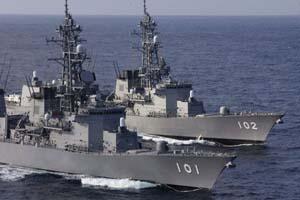World
Will Japanese mission be extended?
WATCH VIDEO
Source: CCTV.com | 11-02-2007 08:41
 |
Japan's navy force
Japan's navy has been providing fuel for warships supporting US-led forces in Afghanistan since 2001. The mission expires on November 1st. Should it be renewed?
Japan is one top allies of the US in Asia. It has been refueling coalition warships in the Indian Ocean for the past six years. But on Thursday, the mission expires.
Thomas Schieffer, US Ambassador to Japan, said, "The international community has received the largest share, has received this oil and has put it to use to fight terrorism. So I think if Japan stopped doing this, on a permanent basis, I think it would be sending a very bad message to the international community and to terrorists, because I think it would be saying that Japan is opting out of the war on terror,for whatever reason, and I hope that doesn't happen."
 |
Japan's navy force
Fearing an expired mission would sour Japan's ties with Washington, the ruling Liberal Democratic Party endorsed a bill to extend it.
The opposition bloc has stood against the extension, arguing it involves Tokyo too deeply in military operations in Iraq and Afghanistan a clear violation of Japan's pacifist constitution.
Last month, the former Prime Minister, Shinzo Abe, resigned suddenly after a year in office. A vocal supporter of the mission's extension, he had hoped that his resignation could aid bipartisan passage of the bill.
His successor Yasuo Fukuda, vowed to get to the bottom of the stalemate.
Yasuo Fukuda, Japanese Prime Minister, said, "I will do my utmost to gain an understanding in the necessity of the extension from the people of Japan and lawmakers."
In an effort to placate the opposition, the LDP narrowed the mission to simply refueling ships engaged in anti-terror patrols. But they failed to persuade the opposition.
Since the opposition parties control parliament's upper house, they can delay legislation from getting passed.
Analysts say the ruling parties can use their two-thirds majority in the lower house to override an upper house rejection of the bill. But there is always the risk of political backlash.
Ma Junwei, Research Fellow, CHINA Inst. of Contemporary Int'l Rel, said, "The LDP still controls parliament's powerful lower house. The LDP could muscle through an extension by overruling the upper house, allowing Japanese ships to eventually return to the Indian Ocean. But in that case, the opposition party might spark a snap general election, which Fukuda cabinet are keen to avoid."
Analysts say compromise is arduous, the mission is certain to be halted for months, if not longer.
Editor:Zhang Pengfei



